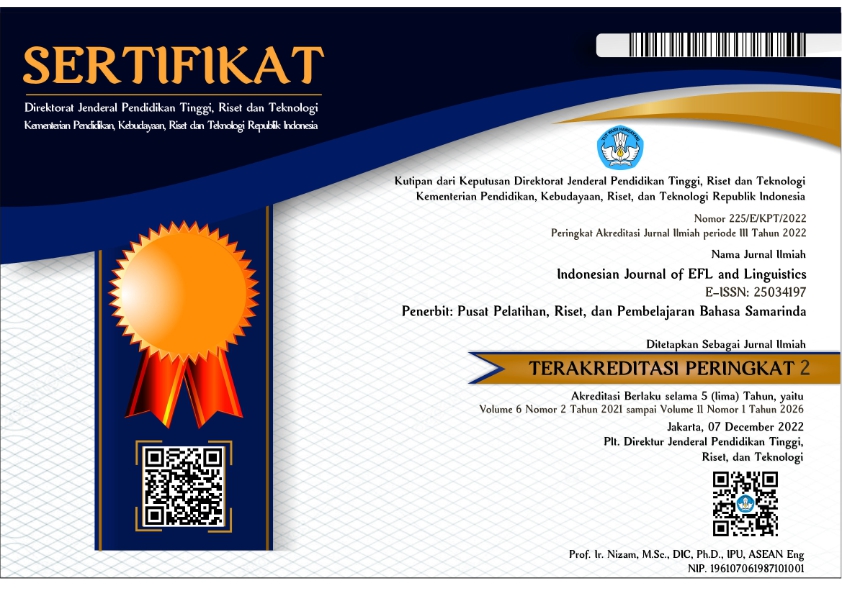The Departure Point in Raising Teacher’s Awareness toward the Atmosphere of Lingua Franca Case
Abstract
There has been growing attentiveness in the English teaching literature of the prominence of English as Lingua Franca (ELF). The foremost position of English as language of global citizen should be raised up in the communication traffic in the world. Research under the case study design had been done to reveal teacher’s belief and their responses in the wave of English as Lingua Franca features in expanding circle, Indonesia. The researchers conducted the study at an Indonesian International School in Surakarta which involved two teachers as the participants by employing interview and unstructured questionnaire to collect the data. The result evidently showed that teachers in expanding circle were aware about the evolvement of English as Lingua Franca in the world. They believed that the features of English as Lingua Franca (ELF) are unproblematic as long as it does not change the fundament of their utterances. Henceforth, the teachers support the lexico-grammar features of ELF. In their speaking class, teachers give tolerance to the students who appearing these features in their classroom interaction. Furthermore, the result of this research could inspire other teachers to be more aware toward the evolvement of ELF, so that they could integrate and apply the relevancy of ELF in teaching learning process.
References
Bayyurt, Y., Kurt, Y., Öztekin, E., Guerra, L., Cavalheiro, L., & Pereira, R. (2019). English language teachers’ awareness of english as a lingua franca in multilingual and multicultural contexts. Eurasian Journal of Applied Linguistics, 5(2), 185–202. https://doi.org/10.32601/ejal.599230.
BELZ, J. A. (2002). “The myth of the deficient communicator”. Language Teaching Research 6/1, 59–82.DOI : 10.1191/1362168802lr097oa.
Bjorge, A. (2012). Expressing disagreement in ELF business negotiations: Theory and practice. Applied Linguistics, 33(4), 406-427. Borg, Simon. 2006. Teacher Cognition and Language Education. London: Continuum.
Borg, M. (2001). “Key concepts in ELT”, in Teacher’s Belief, 55, 2: 186-188.
Crystal, D. (2003). English as a global language (2nd ed). Cambridge: Cambridge University Press.
Curran, J. E., & Chern, C. lan. (2017). Pre-service English teachers’ attitudes towards English as a lingua franca. Teaching and Teacher Education, 66, 137–146. https://doi.org/10.1016/j.tate.2017.04.007.
Farrell, T. (2011). Exploring the professional role identities of novice ESL teachers through reflective practice. Fuel and Energy Abstracts. 39. 10.1016/j.system.2011.01.012.
Fazilatfar, A. M. (2018). Iranian Teacher Trainees ’ Attitudes towards English as a Lingua Franca. (1), 29–60.
Firth, A. (1996). The discursive accomplishment of normality: on ‘lingua franca’ English and conversational analysis. Journal of Pragmatics, 26, 237—259.
Görlach, M. (1990). The development of Standard Englishes. In: Görlach, Manfred (ed.). Studies in the History of the English Language. Heidelberg: Winter. 9–64.
Guba, E. G., & Lincoln, Y. S. (1982). Epistemological and methodological bases of naturalistic inquiry. Educational Communication & Technology Journal, 30(4), 233–252.
Jenkins, J. (2000). The Phonology of English as an International Language: New Model, New Norm. New York, NY: Oxford University Press.
Kachru, B.B. (1986) Non-native literatures in English as resource for language teaching, in C. J Brumfit and R.A Carter (eds), Literature and Language Teaching. Oxford: Oxford University Press, pp. 140-149.
Luo, W.-H. (2018). A study of Taiwanese university students’ English use, learning goals and attitudes toward English as a lingua franca. Studies in Second Language Learning and Teaching, 8(4), 775–794. https://doi.org/10.14746/ssllt.2018.8.4.4.
Miles, M. B., Huberman, A. M., & Saldana, J. (2018). Qualitative data analysis: A methods sourcebook (4th ed.). SAGE Publications.
Nagy, T. (2017). English as a lingua franca and its implications for teaching English as a foreign language. Acta Universitatis Sapientiae, Philologica, 8(2), 155–166. https://doi.org/10.1515/ausp-2016-0024.
Pajares, M. F. (1992) Teachers’ beliefs and educational research: Cleaning up a messy construct, Review of Educational Research, 70:509-517.
Phillipson, R. (2008). Lingua franca of lingua frankensteina? English in European integration and globalisation. World Englishes, 27(2). 250-267.
Richards, J., C., & Lockhart, C. (2005). Reflective practice in second language classroom. Cambridge: Cambridge University Press.
Seidlhofer, B. (2004). Research Perspectives on Teaching English as a Lingua Franca. Annual Review of Applied Linguistics, 24, 209–239.
Seidlhofer, B. (2006). English as a lingua franca in the Expanding Circle: what it isn’t. In Rani Rubdy and Mario Saraceni (eds.), English in the World: Global Rules, Global Roles (pp. 40–50). London: Continuum.
Yin, R. K. (2018). Case study research and application: Designs and methods (6th ed.). Los Angeles: SAGE.




